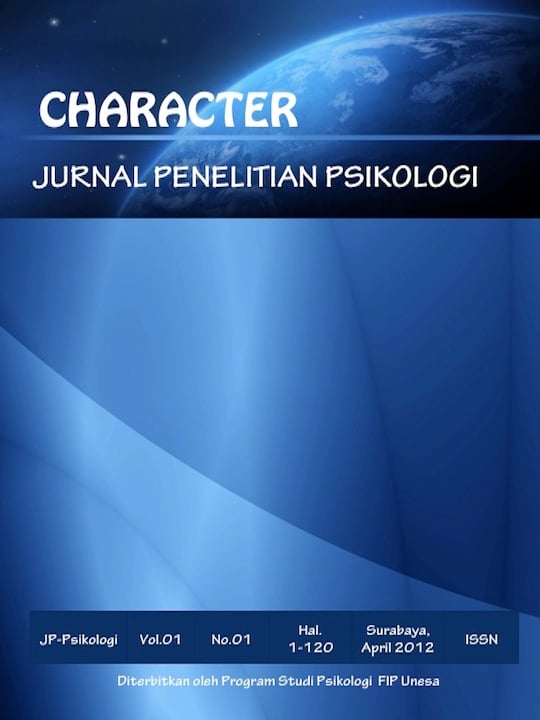PSYCHOLOGICAL WELL-BEING PADA ISTRI YANG MEMILIKI PASANGAN PENYANDANG TUNANETRA
DOI:
https://doi.org/10.26740/cjpp.v9i6.47003Abstract
Abstrak
Penelitian ini mengkaji bagaimana psychological well-being istri yang telah menikah dengan suami seorang tunanetra. Peneliti memusatkan analisisnya pada bagaimana istri dalam memaknai pernikahannya serta dampaknya terhadap psychological well-being. Subjek dalam penelitian ini adalah tiga orang istri yang telah membina rumah tangga selama lebih dari 20 tahun. Penelitian kualitatif ini menggunakan pendekatan studi kasus dan dalam pengumpulan data, peneliti menggunakan wawancara semi-terstruktur dengan ketiga subjek. Peneliti menggunakan analisis tematik dan mengungkap bahwa ketiga subjek pada awalnya mengalami penolakan dari keluarga atas keputusannya menikah dengan seorang tunanetra. Di sisi lain subjek juga merasa khawatir tidak dapat menyesuaikan diri saat membina rumah tangga dan membutuhkan penyesuaian pada tahun awal pernikahan. Namun, subjek meyakini bahwa dirinya mampu mengelola kesulitannya dan dapat menyadari peluang yang ada untuk meningkatkan potensi dirinya. Subjek mengalami respon negatif dari lingkungan tempat tinggalnya tetapi subjek tetap menjalin hubungan yang baik dengan tetangga di lingkungan tempat tinggalnya. Subjek memiliki tujuan dan memaknai peristiwanya secara positif serta menerima aspek baik dan buruk dalam dirinya serta pasangannya. Subjek tidak merasa kecewa atas keputusannya menikah dengan seorang penyandang tunanetra.
Kata Kunci: kesejahteraan psikologis, istri, suami tunanetra
Abstract
This study examines how the psychological well-being of a wife who has married a blind husband. Researchers focused their analysis on how wives interpret their marriages and their impact on psychological well-being. The subjects in this study were three wives who had been in the household for more than 20 years. This qualitative research uses a case study approach and in data collection, researchers use semi-structured interviews with all three subjects. Researchers used thematic analysis and revealed that all three subjects initially experienced rejection from the family over their decision to marry a visually impaired person. In addition, the subject also feels worried about not being able to adjust when fostering a household and needs adjustment in the early years of marriage. However, the subject believes that he is able to manage his difficulties and can realize the opportunities that exist to increase his potential. The subject experienced a negative response from the environment in which he lived but the subject maintained a good relationship with the neighbors in the environment where he lived. The subject has a purpose and interprets the event positively and accepts the good and bad aspects in himself and his partner. The subject did not feel disappointed at his decision to marry a blind person.
Keywords: psychological well-being, wife, visually impaired husband
Downloads
Downloads
Published
How to Cite
Issue
Section
License
Authors who publish in this journal agree to the following terms:
Copyright in any article is held by the author.
The author grants the journal, publication rights with the work simultaneously licensed under a Creative Commons Attribution License that allows others to share the work with an acknowledgment of the work's authorship and initial publication in this journal.
Authors may enter into separate, additional contractual arrangements for the non-exclusive distribution of the journal's published version of the work (e.g., posting it to an institutional repository or publishing it in a book), with an acknowledgment of its initial publication in this journal.
Authors are permitted and encouraged to post their work online (e.g., in an institutional repository or on their website) prior to and during the submission process, as this can lead to productive exchanges, as well as earlier and greater citation of published work.
 Abstract views: 226
,
Abstract views: 226
, PDF Downloads: 257
PDF Downloads: 257





